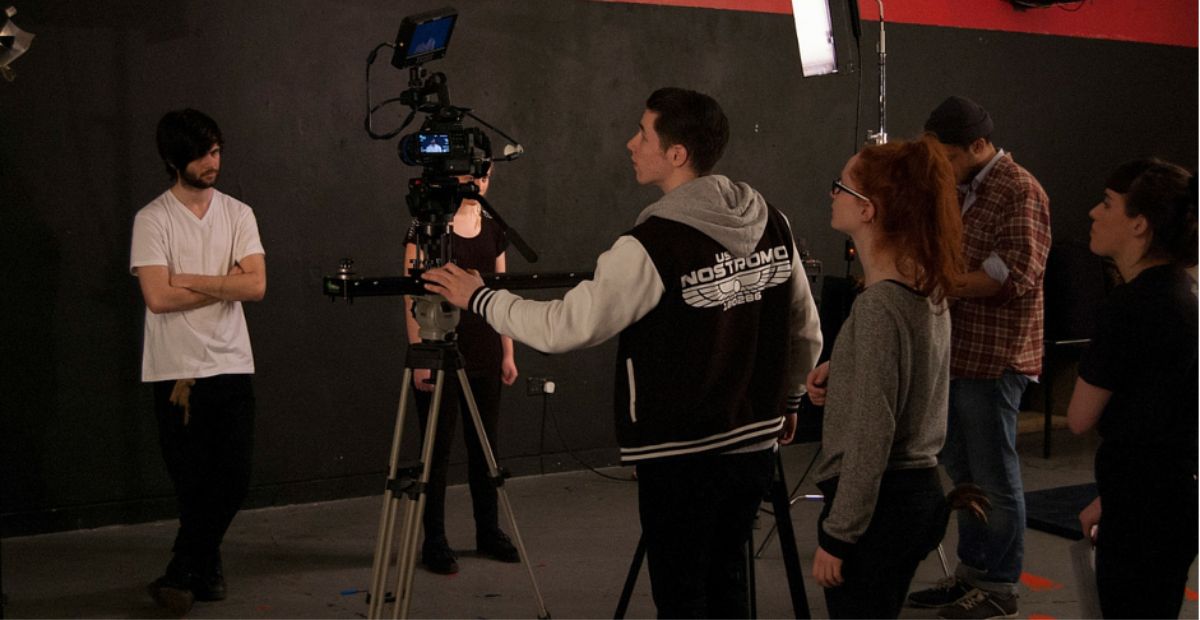The film industry is a captivating world where creativity, glamor, and business intertwine. If you’re an aspiring legal professional with dreams of joining in on the action, a career as a film production lawyer may be perfect for you.
Becoming well-versed in entertainment law and honing your skills within this niche can set you up for success, as the need for specialized lawyers who understand the intricacies of contract negotiation, intellectual property rights, and copyright law continues to rise.
In this blog post, we outline essential information on how to get film production lawyer jobs while offering tips on qualifications, networking strategies, and more.
Table of Contents
Key Takeaways
- To become a film production lawyer, you need to obtain a law degree from an accredited institution and gain relevant experience through internships or assistant roles.
- Developing key soft skills such as communication, attention to detail, time management, and organizational skills is crucial in this field.
- Networking effectively by attending industry events, building strong relationships with professionals in the industry, and establishing an online presence can increase your chances of finding jobs in film production law.
- Keep up-to-date with legal developments by reading trade publications like Variety and staying informed about what’s happening within the entertainment industry.
Understanding The Role Of A Film Production Lawyer

Film production lawyers are responsible for providing legal representation and advice to producers, directors, talent agencies, and other professionals involved in the film industry regarding various legal issues such as contract negotiation, intellectual property rights, copyright law, and financing agreements.
● Essential Responsibilities
As a film production lawyer, your primary role is to safeguard the legal interests of your clients within the entertainment industry.
This entails handling various aspects such as contract negotiations, dispute resolution, intellectual property rights management, and ensuring compliance with relevant laws and regulations.
Moreover, advising on film financing structures is another crucial responsibility that revolves around securing funds needed for a production company’s projects.
This may involve working closely with financial institutions or investors to ensure contractual obligations are fulfilled by all parties involved.
In addition to these core functions, you might also offer counsel on issues related to copyright law or navigate complex licensing deals for distribution rights.
● Key Qualifications And Skills
To excel as a film production lawyer, certain qualifications and skills are paramount in ensuring your success in this niche legal field.
- Firstly, obtaining a legitimate law degree from an accredited institution and passing the bar exam is non-negotiable.
- Apart from education and experience, there are particular skills worth fostering to enhance your competence as a film production lawyer. Proficiency in contract negotiation is crucial since drafting and interpreting complex contracts forms the bedrock of your work with clients such as producers, talent agencies, screenwriters, or production companies.
- Additionally, having comprehensive knowledge of intellectual property rights – which includes copyright law – along with expertise in film financing will set you apart from competitors within the industry.
How To Get Film Production Lawyer Jobs: Qualifications Required

To become a film production lawyer, you must have certain qualifications, including a law degree from an accredited institution and relevant work experience; read on to discover what other key skills are needed for success in this field.
● Education And Experience
To embark on a career as a film production lawyer, obtaining a law degree from an accredited institution is the first essential step. This academic foundation equips you with the necessary legal knowledge and analytical skills required for this niche profession.
In addition to your education, acquiring practical experience through internships or entry-level positions within entertainment law firms will prove valuable.
These opportunities allow you to gain hands-on exposure in various areas of entertainment law, including contract negotiations, intellectual property rights, and copyright issues related to film production.
Furthermore, engaging with professionals already working in the industry can help broaden your network and provide insights into the most effective strategies for securing future roles within film production law.
● Professional Certifications
Professional certifications can be an excellent way for film production lawyers to demonstrate their expertise and commitment to the industry. These certifications are offered by various professional organizations and typically require applicants to pass a rigorous exam.
Another useful certification for aspiring film production lawyers is the Accredited Advisor in Insurance (AAI), which focuses on risk management and insurance issues within the entertainment industry.
Additionally, some law schools may offer specialized courses or certificates related to entertainment law that can help individuals stand out when applying for jobs in this field.
● Relevant Soft Skills
Alongside education and legal experience, relevant soft skills are necessary for a career as a film production lawyer. Excellent communication skills are essential to convey complex legal concepts in an accessible way to clients who may not have a legal background.
Attention to detail is another critical skill required for film production lawyers as even the smallest errors in contracts can be costly for their clients. Time management and organizational skills are crucial to manage multiple ongoing projects effectively.
Developing A Career In Film Production Law

Start building your career in film production law by actively networking and attending industry events, seeking out internships or assistant roles, establishing an online presence, and staying informed about legal and industry developments – read on to discover more.
1. Networking And Industry Events
Networking is a crucial aspect of finding film production lawyer jobs. Attending industry events and building strong relationships with colleagues and potential employers can open doors to new opportunities.
Here are some tips on how to make the most of networking and industry events:
- Attend relevant industry conferences, seminars, and workshops to meet other professionals in the field.
- Join legal associations related to the entertainment industry to connect with other film production lawyers.
- Participate in online forums and groups where you can engage with individuals in the film production industry.
- Seek out mentorship opportunities from experienced film production lawyers or entertainment attorneys.
- Consider volunteering at film festivals or other events where you can meet people working in the entertainment business.
- Be prepared with business cards and a concise pitch about your qualifications and experience as a film production lawyer.
- Follow up with contacts after events through email or social media platforms to stay connected.
By networking effectively, you can increase your chances of finding a job as a film production lawyer while also gaining valuable insights into the entertainment industry.
2. Internships And Assistant Roles
Completing an internship or working in an assistant role is highly beneficial for aspiring film production lawyers. Here are some key points to consider:
- Look for internships at law firms that specialize in entertainment law. This will give you the opportunity to work on real cases and develop your legal skills.
- Consider applying for assistant roles at production companies, talent agencies, or studios where you can gain industry-specific experience and knowledge.
- Take every opportunity to learn from experienced lawyers and producers. Assist them with tasks such as contract drafting, legal research, and script analysis.
- Build relationships with colleagues and clients by being professional, communicative, and reliable. This can lead to more opportunities in the future.
- Keep track of your achievements during your internships or assistant roles. These can be added to your resume or used as examples during job interviews.
Remember, internships and assistant roles are not only great learning experiences but also offer a chance to network within the industry. Use this time to make connections and showcase your skills.
3. Online Presence And Branding
Having a strong online presence and personal branding can significantly increase your chances of getting film production lawyer jobs.
Start by creating a professional website and social media accounts that showcase your skills, educational background, and relevant experience in the entertainment industry.
In addition to highlighting your expertise, it is essential to maintain a positive image online. Avoid controversial topics or posting anything inappropriate that could potentially harm your reputation with potential employers or clients.
By actively engaging with industry professionals on social media platforms like LinkedIn or Twitter, you can also expand your network and gain valuable connections in the field.
4. Keeping Up-to-Date With Industry And Legal Developments
As a film production lawyer, it’s critical to stay up-to-date with industry and legal developments. The entertainment industry is constantly evolving, and new laws and regulations can have a significant impact on production.
To keep your knowledge current, attend conferences and seminars related to the entertainment industry.
Additionally, reading trade publications such as Variety and The Hollywood Reporter will help you keep abreast of what’s happening in the film world. These resources cover topics ranging from production news to legal analyses of recent cases.
Overall, staying informed about both the film industry and relevant legal developments is key for any aspiring or established film production lawyer.
How To Get Film Production Lawyer Jobs

Look for film production lawyer jobs on job boards, and recruitment agencies, or reach out directly to production companies and studios.
● Job Boards And Recruitment Agencies
One of the most common ways to find film production lawyer jobs is by using job boards and recruitment agencies. Here are some tips on how to make the most out of these resources:
- Research: Look for reputable job boards and agencies that specialize in entertainment law or the film industry. Some popular ones include Entertainment Careers, ProductionHUB, and Indeed.
- Set Up Job Alerts: Most job boards allow you to set up alerts based on your preferences, such as location and job type. This can save you time by letting you know when a new relevant position opens up.
- Tailor Your CV and Cover Letter: When applying for positions found through a job board or agency, make sure your CV and cover letter are tailored to the opportunity. Highlight your relevant legal experience as well as your knowledge of the entertainment industry.
- Network with Recruiters: Recruitment agencies often have insider knowledge about upcoming positions in the industry. Take advantage of this by building relationships with recruiters who specialize in legal roles. Keep in touch with them regularly and let them know you’re actively seeking opportunities.
- Be Prepared for Interactions: If you do get contacted by a recruiter or hiring manager, be ready to discuss your qualifications and experience in a concise but compelling way. Research their company beforehand so you can ask informed questions during any interviews.
Remember, job boards and recruitment agencies should be one part of your overall job search strategy. Don’t rely too heavily on them – continue networking, building relationships in the industry, and applying directly to companies whenever possible.
● Industry Contacts And Referrals
Networking is essential for finding film production lawyer jobs, and industry contacts and referrals can play a significant role in landing your dream position.
Reach out to friends, family members, or acquaintances working in the film or entertainment industry to see if they know of any job openings that might suit your skills.
Attend industry events such as conferences, seminars, and workshops where you can meet producers, agents, and other legal professionals who work in the film sector.
Another way to build industry contacts is through internships or assistant roles at law firms that specialize in entertainment law.
Being around experienced attorneys will give you an excellent opportunity to learn from them about how they got started in their careers and how to develop successful legal strategies for clients.
● Social Media Platforms
Social media platforms can be an excellent tool for finding film production lawyer jobs. Many companies and recruiters post job openings on social media platforms such as LinkedIn, Twitter, and Facebook.
Additionally, social media provides a great opportunity to network with other lawyers in the industry. Joining groups or forums related to entertainment law can help build connections with legal professionals who may have leads on potential job opportunities or offer valuable advice about the field.
● Directly Contacting Production Companies And Studios
Another way to find film production lawyer jobs is by reaching out directly to production companies and studios. Most of these organizations have legal departments or need legal representation for their projects, which can create job opportunities for film lawyers.
Once you identify potential employers, prepare a well-crafted cover letter and resume outlining your experience and qualifications as a film lawyer.
Highlight your knowledge of entertainment law, contract negotiation skills, intellectual property rights expertise, and any other relevant industry-specific legal issues you have dealt with in the past.
Demonstrate how you can add value to their projects through effective legal representation.
Preparing For Film Production Lawyer Job Interviews
When preparing for film production lawyer job interviews, it’s crucial to research the company and its projects, familiarize yourself with contracts and regulations, practice common interview questions, and dress professionally.
● Researching The Company And Its Projects
To prepare effectively for a film production lawyer job interview, it is necessary to research the potential employer and its projects thoroughly. Here are some tips on how to go about it:
- Go through the company’s website and social media profiles for information on its mission, values, past projects, and future plans.
- Keep an eye out for any news articles or press releases related to the company’s recent activities or upcoming productions.
- Find out who the key decision-makers are at the company and their roles. This will help you tailor your application and interview answers accordingly.
- Understand the legal issues that may arise in film production. Familiarize yourself with contract negotiation, intellectual property rights, copyright law, film financing, talent agencies, screenwriting legal issues, and any other legal matters relevant to the industry.
- Look for industry publications specific to entertainment law or film production law. Reading these publications can provide valuable insight into trends in the field.
By conducting thorough research on potential employers and keeping up-to-date with industry developments, you can position yourself as a knowledgeable candidate who is well-suited for a career in film production law.
● Familiarizing Yourself With Contracts And Regulations
As a film production lawyer, a major aspect of your job would be reviewing and drafting contracts for various aspects of the film industry such as financing, distribution, and talent agreements.
To familiarize yourself with these contracts, it is important to keep up-to-date with constantly evolving regulations in the entertainment industry.
One valuable resource is The Hollywood Reporter which covers recent legislative changes that may impact film producers and their legal teams.
When reviewing contracts in preparation for interviews or on-the-job tasks, focusing on key elements like confidentiality clauses, intellectual property rights protections, and compensation structures can help you spot potential red flags before they become legal issues.
Ultimately becoming a successful film production lawyer requires not only mastering the legal side of things but also possessing knowledge of how this complex industry operates and understanding its unique challenges.
● Practicing Common Interview Questions
Being prepared for your film production lawyer job interview is crucial to ensuring a successful outcome. One way to prepare for interviews is by practicing common questions that you may be asked during the process.
To answer these types of questions, it’s important to have relevant examples and anecdotes ready that showcase your legal knowledge and experience, as well as your problem-solving skills.
Additionally, consider researching potential interviewers or the company you’re interviewing with beforehand so that you can tailor your responses accordingly.
● Dressing Professionally
As a film production lawyer, it’s important to present yourself in a professional manner. Dressing appropriately for the job can make a significant impact on how you are perceived by potential employers or clients.
You want to look polished and put together while still being comfortable enough to manage any tasks that come your way. When dressing for an interview or meeting with clients in the film industry, consider the tone of the project you’ll be working on and dress accordingly.
For example, if you’re meeting with a producer who is filming an independent movie, opt for business casual attire like slacks and a blazer or blouse. If you’re attending a premiere event, more formal attire may be required such as cocktail dresses or suits.
Whatever the occasion, remember that your clothing should not be too distracting or flashy – keep it simple and elegant to convey professionalism and competence in your legal abilities.
Succeeding As A Film Production Lawyer
Build strong relationships with clients and colleagues by communicating effectively and strategically, staying up-to-date with industry developments, and maintaining professionalism and a positive attitude.
● Building Strong Relationships With Clients And Colleagues
As a film production lawyer, it is crucial to establish strong relationships with clients and colleagues.
To build strong client relationships, showcase your legal expertise, and provide guidance throughout the production process. Remain accessible and responsive to their needs, addressing any concerns or questions they may have promptly.
When working with colleagues in the industry, seek out opportunities for collaboration on projects or events. Attend networking events and maintain an online presence through platforms such as LinkedIn to expand your network of contacts.
Ultimately, building solid relationships requires active effort and genuine interest in others’ success.
● Communicating Effectively And Strategically
Effective and strategic communication is crucial for film production lawyers to succeed in their roles.
To communicate effectively, it is essential that you master active listening skills. This means taking the time to understand your client’s needs, concerns, or goals before crafting an appropriate solution or response.
In addition to strong interpersonal skills, film production lawyers should have excellent written communication abilities since most of their work involves drafting contracts and agreements.
It’s important as well for lawyers within this field not only to stay current with the latest industry changes so they can provide sound counsel but also to keep track of new regulations as compliance matters could be very important for filmmakers who do business internationally or deal with streaming platforms like Netflix or Hulu.
● Staying Up-to-Date With Industry Developments
As a film production lawyer, it is crucial that you stay up-to-date with industry developments. The entertainment industry is constantly evolving, and new technologies and platforms are emerging all the time.
One effective way to stay informed is by reading trade journals such as Variety or The Hollywood Reporter. You should also attend relevant conferences and seminars that focus on entertainment law topics.
Another important aspect of staying up-to-date with industry developments involves maintaining a social media presence as well as following influential individuals in the field.
Finally, attending screening events where filmmakers showcase their latest projects could benefit lawyers looking to gain further insight into how films are made from both artistic/creative perspectives along with legal considerations.
● Maintaining Professionalism And A Positive Attitude
As a film production lawyer, it is essential to maintain professionalism and a positive attitude at all times. This includes treating clients with respect and dignity, even in challenging circumstances.
In addition, maintaining professionalism requires staying up-to-date on industry developments and legal regulations. A good understanding of intellectual property rights, copyright law, and contract negotiation is crucial for providing adequate legal representation in the film industry.
Doing so can create a strong reputation as an effective advocate for your clients while building lasting relationships with colleagues and employers.
Conclusion On How To Get Film Production Lawyer Jobs
Becoming a film production lawyer requires a combination of legal expertise and industry knowledge. You must obtain a law degree, gain relevant experience, and develop essential soft skills to succeed in this field.
Building your network through internships, attending events, and keeping up-to-date with developments is critical for finding job opportunities. When applying and interviewing for jobs, researching potential employers is important to tailor your applications effectively.
Finally, communication skills are key when working with clients and colleagues within the film industry.
Related Post:







